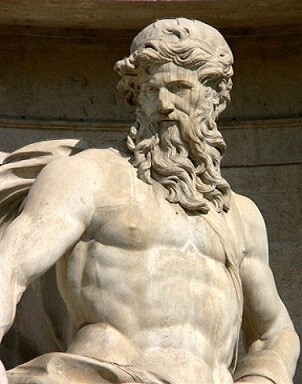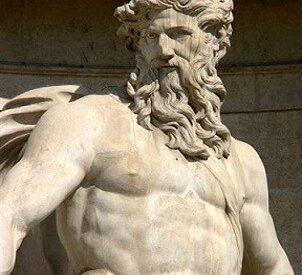
In Homer?s Odyssey, we follow the travels of Odysseus as he attempts to return to his homeland of Ithaca, after the ten years he spent at Troy. In many ways, Odysseus is the most rounded and complex of the Greek heroes in Homer. He is lauded as godlike many times, and praised for many qualities that the poet considers heroic. He follows codes of honour, and is extremely faithful towards his friends, his crew, and his wife. His loyalty towards his allies is a definite trait of a hero. His strength and physical prowess both in battle and in competitions is also a necessity for Homeric heroes. However there is also another side of Odysseus that is perhaps more morally ambiguous by our modern standards. Odysseus is a trickster and a liar, who fabricates false stories in order to deceive people, sometimes even his friends. However, surprisingly this is not looked down on by the poet, but in fact is praised by Athena herself in the poem. Her appreciation of a kindred spirit is considered one of the main reasons why she is so favourable to Odysseus and helps him numerous times on his quest to return to Ithaca and depose of the evil suitors. In this way, Odysseus is being used by the Gods; his destiny is not of his own choosing, which is often another trait attributed to heroes and how they fit into the larger mythological picture. Another way Odysseus by lying actually becomes an even greater hero is that, true or not, his stories make him into a bard, a storyteller much like Homer. And it is clear from the other bard characters in the poem, that bards and storytellers have a special and revered place in this society. Homer treats Odysseus as a great hero not only because of his physical strength and his adherence to the value systems shown in the poem, but also because of his ability to scheme and to use subterfuges to get his own way, often through the art of storytelling. In fact, Homer praises Odysseus?s schemes and deceptions much more than his accomplishments of strength, and time and time again in the Odyssey Odysseus?s quick thinking and plans save him where brute strength would have failed.
The most common way heroes are defined as such in Homer is from their feats of strength and their physical abilities. In the Odyssey, Odysseus proves himself to be in top peak condition several times. When he comes ashore on the island of the Phaiakians, and is taken in, the Phaiakians arrange a series of competitive games. Odysseus initially declines to compete, but provoked by the rude Euryalos, he throws a discus farther than any other person, at least according to Athena (VIII. 185?200). In this way, he proves himself to the Phaiakians and is even more glorified by them. This occurs several times during the Odyssey; a parallel to the athletic competition on Scheria is when Odysseus arrives back on Ithaca and meets with the suitors. He is soon insulted by the beggar Iros who, like Euryalos of the Phaiakians, challenges him to a match of strengths. Again Odysseus is made angry, and he clearly shows his dominance over Iros by knocking him out. (XVIII. 90?100) In this way, Odysseus wins some food at the table of the suitors. However, Odysseus?s strength rarely helps him achieve his goals in the long term, but instead mostly helps him gain respect from the people he impresses.
A common Homeric trait of heroes seen in the Odyssey is loyalty and the following of sometimes unspoken codes of conduct. When someone is treacherous in anyone way, they always are punished in the end, whereas someone who proves themselves to be pious is, while not necessarily rewarded, at least spared a gruesome death. When Odysseus returns to his homeland, he meets many of his old servants and, by their treatment of him as a stranger and their loyalty to Odysseus the seemingly far- away figure, he decides whether or not to punish them. One of the first people Odysseus, who is disguised as a beggar, meets is the swineherd Eumaios. Eumaios honours the ancient Greek concept of Xenia by taking in Odysseus and feeding him and providing a place for him to sleep for the night. The hospitality of Eumaios shows that he cares to follow the Greek customs, which seems to be of high importance to the poet. (XIV.40?200) Contrast the hospitality of the swine herd with the hospitality Polyphemus the Cyclopes or rather lack thereof, and a pattern can start to be seen. If someone treats Odysseus well, then they are either rewarded slightly, or are spared death or mutilation. Polyphemus, as a Cyclopes, does not feel that he needs to follow Xenia, but in the end is blinded for his treatment of the hero. Likewise on Ithaca, the goat herd Melanthios and the unfaithful maids treat the disguised Odysseus with no respect or hospitality and are suitably punished in the end. Bringing this back to Odysseus as a hero, when Odysseus punishes someone who is not following the customs laid out by the poet, he is seen as carrying out justice. Odysseus did not need to kill all the suitors, but was compelled to do so because of their outrageous abuse of the customs of hospitality. Odysseus is more than just enacting revenge, he is bringing retribution onto guilty persons. And in this way, he is a hero.
Loyalty goes both ways as well, and if Odysseus was not exemplary in his loyalty and faithfulness to his wife and his kingdom, he would probably be considered little better than the suitors. However Odysseus is extremely devoted to his wife, and even when washed up on distant shores and tempted by women like Circe, Calypso, and Nausikaa, he always is thinking back to his wife. When stranded on Ogyia in the company of Calypso, he is forced against his will to lie with her at night, but during the day he sits, weeps, and yearns for his homecoming. (V.150?160) This remarkable dedication to returning home is a major part of Odysseus?s heroic identity.
The fact that the gods take such an interest in the struggles of Odysseus also reveals his importance. Poseidon is so angered by Odysseus?s actions against his Cyclopes son, that he causes the greek ships to be battered by many storms. Even when Odysseus is saved by the Phaiakians and shipped to Ithaca, Poseidon decides to punish them for aiding him, turning their ship into stone. He would have also crushed their entire island under a mountain, if Zeus had not ordered him not to. (VIII.140?170) Athena, by contrast, is a great friend to Odysseus, and is in many ways his patron. The attention, help, and advice she gives him throughout the story, but especially during the later part of the poem on Ithaca, is vital to his schemes succeeding. It is truly the mark of a hero when the gods take a such a special interest into hindering and helping him.
Here we come to some the more surprising aspects of Odysseus?s heroic character, details that Homer deliberately makes a core part of his identity. Firstly, Odysseus is a bard, like Homer himself. The middle section of the Odyssey is all Odysseus telling the story, in his own words, of his travels over the ten years he was lost at sea. By telling the Phaiakians of his exploits, he gains their respect and admiration and they give him many valuable treasures. This happens time and time again, where being a bard or a storyteller of some kind enables someone to be rewarded or spared. After the massacre of the suitors, the only people who are spared is the singer and the herald. The singer tells Odysseus that ?You will be sorry in time to come if you kill the singer of songs? and goes on to say that his talents were given to him by the gods themselves. (XXII. 340?360) That is a key point as well to the art of storytelling, that can be seen by the invocation of the muses at the beginning the Odyssey. Storytelling and singing are considered sacred by the society Homer lays out in his poem. There is a connection to the eternal by the telling of stories, and Odyssey is in many ways the master storyteller of them all.
A trait perhaps similar to storytelling is lying; and this surprisingly is the most useful of Odysseus?s heroic attributes given to him by Homer. Lying may seem like a unattractive quality in a person, but Homer obviously does not see it that way. Instead he praises Odysseus?s cunning, and uses it many times throughout the story as a way of Odysseus getting what he wants. Time and time again throughout the story, Odysseus is forced to use his wits in order to trick his way out of unpleasant and potentially fatal situations. Upon reaching the island of the Cyclopes and finding him and his men trapped in Polyphemus?s cave, Odysseus comes up with the plan to punish Polyphemus by blinding him. He also uses the trick of ?Nobody? to prevent Polyphemus from receiving help from his fellow Cyclopes. His plans allow him and his men to escape. He did not use brute strength to defeat his enemy in this case, instead using his talent for schemes. (IX.350?400) Homer praises Odysseus for his cunning many times, often calling him ?resourceful Odysseus?. Odysseus?s wits are put to the test again on Circe?s island, where he again tricks his adversary, Circe in this case, and is rewarded for his cunning by the enchantress herself (X.300?330). This is another pattern that emerges in the Odyssey; Odysseus?s lying and cheating his way out of trouble almost always ends up to his benefit. Much more than qualities that would normally be associated with heroism, Homer uses Odysseus?s penchant for concocting schemes to further both the plot and Odysseus?s triumphs within it. It is, more than any other attribute normally associated with heroism, useful and practical within the context of the story. This is even more clear when it comes to the case of the suitors. Odysseus may well have simply returned guns blazing to his house without any subterfuge and still survived. However he deliberately chooses the long game and plans the destruction of all who are disloyal to him. This calculation may be seen as cold-hearted, but Homer does not portray it as such. Instead the poet sees it as a necessary and well thought out course of action. Through his calculating vengeance upon the suitors Odysseus may not seem like a standard Greek hero of the time, but there is something in the way he deliberates and at first holds back that Homer sees as deserving of praise.
Odysseus is a great hero from the perspective of Homer. He has all the qualities that make up someone like Herakles or Agamemnon. He has impressive physical strength beyond the capabilities of an average man. He is doggedly loyal to his family, his comrades, and his home. In some ways he is an enforcer of the will of the Gods, especially Athena. But he has also another side to him, one that by ancient Greek standards may not seem heroic, in fact in many other cases is seen as treacherous and villainous. He is a gifted storyteller for stories true and false, and has a great mind which he uses to trick numerous people along the way. Homer, instead of condemning the deceits of Odysseus, praises his resourcefulness and uses this aspect of his character, more than any other, to further the plot. It is also most important in him achieving his goals. Homer commends and raises up the scheming and deceptive parts of Odysseus, a side to him that would not normally be seen as heroic. By making it the cornerstone of him as a hero, Homer is differentiating Odysseus from other heroes, yet keeping him as their equal.
Works Cited
Homer, and Richmond Lattimore. The Odyssey of Homer. New York: Harper & Row, 1967.


